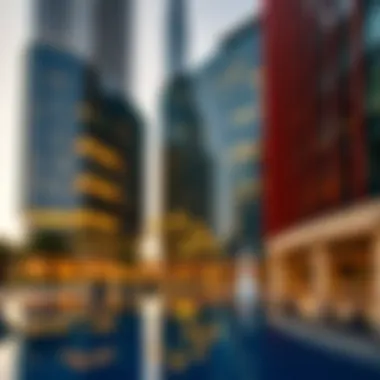Navigating Commercial Real Estate in Dubai's Market


Intro
The commercial real estate landscape in Dubai has seen more than its fair share of transformations over the years. With an economy that blends traditional values and modern innovation, Dubai entices investors and expatriates eager to tap into its potential. Hospitality, retail spaces, and office buildings are just the tip of the iceberg. Each segment presents distinct latest opportunities and challenges.
Investors and stakeholders alike need to stay informed about current trends and be aware of factors that could influence their decisions in this dynamic environment. Whether one is stepping into the market for the first time or has years of experience under their belt, understanding the nuances of the local landscape becomes essential. This article aims to provide a roadmap, offering invaluable insights that will help you navigate through the sometimes murky waters of commercial real estate in Dubai.
Market Insights
Current Trends in Dubai Real Estate
Dubai's real estate market has been buzzing with activity recently. As the city emerges from pandemic-induced constraints, there's renewed interest from developers and investors. Office spaces, especially in business districts such as Dubai International Financial Centre, are witnessing a surge in demand. Flexible work arrangements have nudged many firms to reconsider their office spaces, leaning towards locations that offer both versatility and accessibility.
Moreover, the hospitality sector is rebounding strongly. As global tourism resumes, hotels and serviced apartments are in high demand. This trend not only drives investment but also uplifts related sectors like retail and entertainment. Some buyers are also looking at mixed-use developments due to their potential to generate diverse income streams.
“Investing in mixed-use properties can offer a buffer against market fluctuations.”
The rise of e-commerce has introduced new demands for commercial warehouses and distribution centers. Proximity to logistics hubs, such as Jebel Ali Port, is crucial in these decisions, as timely delivery remains a priority for businesses.
Price Fluctuations and Forecasts
The going rates for prime properties in Dubai are influenced by a variety of factors, including supply and demand, economic conditions, and regional stability. Recently, buyers have noted that prices are stabilizing after a prolonged period of fluctuations. Reports suggest that certain areas like Dubai Marina and Downtown Dubai have shown increased activity, driving values higher.
According to property analysts, the next few years will see incremental increases in prices, particularly in well-located commercial properties. Ongoing infrastructure projects and the Government's continued push for economic diversification are expected to bolster this upward trajectory. Thus, investors should keep a keen eye on upcoming developments that could signal the next wave of growth.
Ultimately, understanding these price movements not only helps in making wise investment decisions but also aids in forecasting future opportunities across the skyline of this magnificent city.
Property Buying Guides
Steps to Buy Property in Dubai
Venturing into the property market in Dubai necessitates a clear understanding of the purchasing process. First things first: it's imperative to know your budget and the type of property that aligns with your investment goals. Are you looking for a commercial space, an office, or perhaps an investment in retail? Once your objectives are crystal clear, the following steps can guide your purchase:
- Research the Market: Familiarize yourself with various areas in Dubai and determine which locations cater to your intended use.
- Engage with Professionals: Collaborating with local real estate agents, legal advisors, and financial experts can streamline your journey. They provide insights and advice tailored to your needs.
- Secure Financing: Various financing options, including mortgages, are available. It's advisable to talk to banks or financial institutions early in the process.
- Property Viewing: Always visit potential properties and assess them in person. Photographs can be misleading.
- Negotiate Terms: When you find a property you like, negotiating terms becomes crucial. Understand market value and remain firm on your budget during negotiations.
- Finalizing Contracts: Once you've come to an agreement, you'll need to finalize contracts. This is where having a competent legal advisor pays off.
Legal Considerations for Buyers
Before signing on any dotted lines, you should be aware of legal requirements surrounding property purchases in Dubai. Some key points to consider include:
- Ownership Rights: Verify whether the property is held under freehold or leasehold terms.
- Required Documentation: You'll need valid identification, proof of income, and sometimes a no-objection certificate from your employer, especially as a foreigner.
- Fees and Taxes: Understand the associated costs, like registration and maintenance fees, to avoid surprises post-purchase.
- RERA Registration: The Real Estate Regulatory Agency governs transactions in Dubai and mandates that purchases be registered properly for legal validity.
By adhering to these considerations, buyers can avoid potential pitfalls that often ensnare those unfamiliar with local laws and regulations.
Every step taken toward understanding and engaging in Dubai's unfolding commercial real estate landscape can lead to significant rewards for those prepared to put in the effort.
Understanding Commercial Real Estate
Navigating the realm of commercial real estate in Dubai is akin to finding your way through a bustling marketplace. It's a vibrant sector, rich with opportunities and complexities. For stakeholders like investors and developers, a solid grasp of commercial real estate is paramount. You need to understand not only the definition but also its broader implications. Evaluating how this sector fits into the economic fabric of Dubai helps pinpoint viable opportunities.
Definition and Scope
Commercial real estate encompasses properties used for business purposes, rather than residential living. This includes:
- Office spaces – For businesses ranging from startups to large enterprises.
- Retail properties – Stores and shopping centers that cater to consumer needs.
- Industrial facilities – Warehouses and manufacturing sites critical for production and distribution.
- Mixed-use developments – Combining residential, commercial, and leisure spaces.
- Hospitality and leisure – Hotels and entertainment facilities that welcome visitors.
Each type of property serves a distinct purpose and attracts specific investors. Understanding these facets is crucial to making informed decisions in Dubai's competitive market.
Importance in the Economy
The role of commercial real estate in Dubai is far-reaching:
- Economic Growth: It contributes significantly to the economy, driving job creation and investment. As Dubai positions itself as a global hub, the demand for commercial properties continues to escalate.
- Infrastructure Development: Many commercial property projects enhance the city's infrastructure, often leading to improvements in transportation and amenities for residents and tourists alike.
- Foreign Investment: Commercial real estate attracts foreign investors, showcasing Dubai's appeal as a stable and lucrative market.
- Job Creation: More businesses equate to more jobs, which in turn fosters consumer spending and boosts local businesses.
A quote worth noting is:
"The commercial sector is the backbone of Dubai's economic vision, supporting a dynamic and evolving society."
In summary, understanding commercial real estate is the bedrock for anyone considering investment in Dubai. It offers insights into market trends and economic health, essential for making strategic decisions. A well-informed investor or developer not only navigates this landscape better but also contributes positively to the broader economic landscape of the city.
For further exploration, you can visit links like Wikipedia on Real Estate or Britannica on Commercial Property.
Types of Commercial Properties
Understanding the types of commercial properties is pivotal for anyone looking to make informed decisions in Dubai's vibrant real estate market. Each property type serves distinct functions and caters to diverse investment strategies. Knowing these nuances helps investors, homebuyers, realtors, expatriates, and developers align their objectives with market demands, ensuring that they make moves that are not just tactically sound but are also economically viable. Each category also introduces unique benefits and considerations, influencing investment potential and risk assessment.
Office Spaces
Office spaces in Dubai have evolved dramatically due to the surge in businesses establishing their foothold in the region. These spaces range from flexible co-working environments to high-end executive suites. The demand for such properties has seen an upward trajectory, especially in areas like the Dubai International Financial Centre (DIFC) and Downtown Dubai.
Investors find office spaces appealing mainly because they often offer steady rental income. Moreover, businesses are increasingly adopting hybrid working models, which has led to a sheening interest in flexible workspaces. This environment potentially creates an attractive entry point for investors looking to cater to startups or multinational corporations seeking office solutions.
However, competition in this sector is fierce. New developments spring up almost overnight, prompting existing landlords to consider amenities and technology integration as critical factors in attracting tenants. Safety and health protocols post-COVID-19 also now play a critical role in tenants' property choice, highlighting the need for adaptive property management strategies.
Retail Properties
The retail landscape in Dubai is as vibrant as the city itself, presenting significant opportunities for investors. From sprawling malls like The Dubai Mall to boutique shops lining Jumeirah Beach, retail properties can yield substantial returns. Retail spaces not only benefit from consumer spending but also attract a steady flow of tourists, which is a boon for business owners.
Investors should note that the rise of e-commerce has pushed many traditional retailers to rethink their physical presence. This shift leads to opportunities in experiential retail, where stores become venues for engaging consumers beyond just transactions. Furthermore, the strategic location of retail properties, particularly in high-footfall zones, can make or break their success.
Industrial Facilities


Industrial facilities are increasingly becoming a focal point of Dubai's real estate sector. This includes warehouses, logistics hubs, and manufacturing spaces that are essential for supporting the logistics and trade sectors, given Dubai’s geographical advantage.
The global supply chain dynamics and e-commerce boom have put industrial properties in the spotlight. Investors see these facilities as a shield against economic downturns given their necessities in operations. Areas such as Dubai Logistics City are prime examples of how industrial properties are adapting to meet growing market demand.
However, while investment in industrial facilities can be promising, investors need to evaluate zoning laws, accessibility for transportation, and local infrastructure which can greatly influence operational efficiencies.
Mixed-Use Developments
Mixed-use developments are tailored to meet the ever-evolving demands of urban living. By marrying residential, commercial, and leisure elements within a single property, these developments encapsulate modern living trends, fostering community interaction while making the best use of space in bustling areas.
In Dubai, these developments often include shopping centers, offices, and residential units, allowing for a holistic approach to urban living. They can enhance property values and create vibrant neighborhoods. Investors benefit from reduced risk due to the diversification of income streams across different sectors; if retail suffers, for instance, rental yields from residential units can compensate.
Hospitality and Leisure
The hospitality and leisure sector in Dubai is pivotal, given the city’s status as a global tourism hub. Properties under this category include hotels, resorts, and entertainment complexes which seem almost endless, thanks to the city's status as a premium vacation destination.
Investing in this sector can be lucrative, particularly with events like Expo 2020 and other international conferences driving footfall. However, investors must navigate through the seasonal fluctuations in visitor numbers and the inherent risks tied to tourism trends. Distinctive branding and top-notch service are vital in this highly competitive landscape, where maintaining guest satisfaction can lead to sustained occupancy and profitability.
When investing in hospitality and leisure, understanding shifts in travel patterns can be a game changer.
Market Trends in Dubai
Understanding the market trends in Dubai is not just a peripheral concern for anyone in the commercial real estate sector; it’s a crucial aspect that shapes investment strategies, property valuations, and overall market viability. The unique blend of economic growth, cultural diversity, and government initiatives all influence market dynamics, making it important for investors, homebuyers, realtors, and developers to keep an eye on the latest trends.
Investing in commercial real estate in Dubai can be a profitable venture, but without recognizing and adapting to these trends, even seasoned investors may find themselves at a disadvantage. The constantly evolving landscape requires stakeholders to stay informed about current developments, regulatory adjustments, and economic shifts that could impact property values and investment returns.
Current Market Dynamics
The commercial real estate market in Dubai is characterized by its dynamism. Recent reports indicate a slight recovery after the economic impacts of global events. A surge in demand for office spaces and retail properties signifies a robust bounce back, as companies continue to establish operations in the region, drawn by the favourable business climate and tax benefits.
There are several factors influencing these current dynamics:
- Increased Foreign Investment: With a more open regulatory framework, foreign investors are pouring funds into Dubai. A large number of companies also find it easier to set up businesses in Free Zones, enhancing office space demand.
- Technological Integration: The adoption of smart technologies in property management is another trend reshaping the market. Investors now seek properties that boast energy efficiency and intelligent management systems.
- Compelling Demographics: Dubai's diverse population and the influx of expatriates seeking employment and business opportunities enhance the rental market, pushing up demand in both residential and commercial sectors.
"Understanding market dynamics is less about forecasting bombshells and more about identifying gradual shifts and adapting accordingly."
Investment Hotspots
Dubai boasts several investment hotspots that continue to thrive in the commercial real estate sector. Areas like Dubai Marina and Downtown Dubai have seen consistent growth in property values due to their strategic locations and popularity among businesses and visitors alike. Key points about these hotspots include:
- Dubai Marina: Known for its stunning waterfront views and lifestyle appeal, Dubai Marina attracts both business and leisure investments. Office space and retail outlets here see higher rental yields than in many other areas.
- Downtown Dubai: This iconic district, home to landmarks such as the Burj Khalifa and The Dubai Mall, remains a prime location for premium commercial spaces. The presence of high-net-worth individuals in the area contributes to a thriving retail sector.
- Dubai Design District (d3): This creative hub promotes design and creativity and is quickly becoming a favourite among startups and established businesses alike, offering versatile office spaces and facilities.
Emerging Sectors
Beyond traditional commercial properties, Dubai's landscape is witnessing the rise of emerging sectors, which are enriching the commercial real estate market. Among these, science and technology parks, health and wellness establishments, and e-commerce warehouses are gaining ground.
- Tech Parks: With a concentration of startups and tech giants, these parks benefit from government support and incentives, making them lucrative for investors.
- E-commerce Growth: A spike in online shopping has led to increased demand for logistics centers and warehouses, a sector that’s exceptionally relevant in today’s retail climate.
- Health Sector: The demand for outpatient facilities and private healthcare outlets continues to grow, necessitating commercial spaces that cater to these needs.
Adapting to these emerging sectors can catalyze successful investment strategies, providing ample opportunities for growth in a bustling market.
In summary, being attuned to the intricate market trends in Dubai not only enhances investors' chances of success but also ensures that they make informed decisions based on solid data and insights. The commercial real estate landscape here is vibrant and full of potential, but it requires a careful approach and continuous monitoring.
Key Players in the Market
The commercial real estate landscape in Dubai is shaped significantly by various key players. Understanding their roles is essential for anyone looking to invest or engage in this dynamic sector. Each group contributes uniquely, influencing market dynamics and shaping future trends.
Developers
Developers are the architects of the Dubai skyline. They orchestrate the planning, construction, and sale or lease of properties, playing a crucial role in shaping the market. With the city’s ambitious growth targets, real estate developers have been pivotal in transforming barren lands into bustling business hubs, luxurious accommodations, and vibrant retail spaces.
Key players like Emaar Properties and Nakheel are household names that have launched iconic projects such as Burj Khalifa and Palm Jumeirah, respectively. This success isn’t just about bricks and mortar; it involves understanding buyer needs, market trends, and zoning laws. Developers take considerable financial risks, ensuring that their projects not only meet current demands but also anticipate future needs.
Some vital considerations for investors include:
- Financial Backing: Evaluate the financial stability of a developer. A robust balance sheet often indicates reliable project delivery.
- Experience: A proven track record can indicate a developer’s ability to navigate market fluctuations.
- Innovative Designs: Look for creativity in their projects, which often results in higher market demand.
Investors
Investors are the driving force behind the commercial real estate market in Dubai. They bring capital to the table, enabling the development of new properties and the renovation of older ones. Investors range from large institutional entities to individual buyers.
The diverse landscape means that investment strategies and expectations can vary greatly. High-net-worth individuals often look for luxury properties, while institutional investors might seek stable returns from commercial office buildings or retail spaces. The ultimate goal remains the same: generating returns on investments, whether they prefer holding assets long-term or flipping properties for quick gains.
Key elements that investors should bear in mind include:
- Market Trends: Keeping an ear to the ground helps investors understand when to buy or sell.
- Location: Investing in sought-after locales increases the likelihood of rental income, capital growth, and overall asset appreciation.
- Regulatory Environment: Understanding local laws is crucial to protect investments and avoid potential pitfalls.
Real Estate Agencies
Real estate agencies serve as the connective tissue in the property market. They bridge the gap between buyers and sellers, providing invaluable insights into current market conditions and trends. Agencies like Better Homes and Engel & Völkers leverage local expertise to guide clients effectively through the buying or leasing process.
Their services encompass more than mere property listings; they offer advisory roles, market research, and negotiations, which are critical for both buyers and sellers. Agencies can significantly impact transaction velocity and market knowledge, making them indispensable in navigating this competitive landscape.
Important aspects about real estate agencies include:
- Expertise: Agents with extensive local knowledge are better positioned to offer informed advice.
- Negotiation Skills: Strong negotiation can significantly affect deal structures and final agreements.
- Marketing Techniques: Innovative marketing strategies maximize property visibility, attracting a larger pool of potential buyers or tenants.
"In the realm of commercial real estate, collaboration among developers, investors, and real estate agencies forms the backbone of a thriving market. Each player has a role to play; together they drive success."
Understanding these key players can lead to informed decision-making and strategic investments in Dubai’s commercial real estate environment.


Investment Considerations
Investment considerations in commercial real estate are the backbone of any successful venture in Dubai's dynamic landscape. For investors, understanding the nuances of financial implications, risk assessments, and long-term value growth is essential. Each component influences how one navigates the market and shapes potential returns on investment. With Dubai being a global hub, the stakes are high, and smart decision-making is crucial.
Financial Implications
The financial implications of investing in commercial real estate in Dubai extend beyond the initial purchase price. Here are several factors that investors need to consider:
- Transaction Costs: These include various fees like registration, agent commissions, and legal fees. Knowing these up front can help in budgeting effectively.
- Financing Options: Investors must evaluate available financing options, including mortgages and loans from institutions. Interest rates and repayment terms can vary dramatically.
- Operational Expenses: Ongoing costs like maintenance, property taxes, and service fees need to be meticulously planned to ensure that they do not erode profitability.
- Rental Yields: A potential investor should consider current rental yields in the area. Some neighborhoods offer higher returns than others, and understanding these trends is key when choosing a property.
Overall, a firm grasp of these financial aspects not only aids in making informed decisions but also prepares investors for the journey ahead.
Risk Assessment
Investing in commercial properties in Dubai is not without risks. Factors such as market volatility, economic downturns, and changing regulations can impact property value. Here’s what to consider:
- Market Analysis: Conduct thorough market research to understand trends and predict fluctuations. Being alert to changes in demand for various property types can aid in forecasting potential downturns.
- Economic Factors: Keep an eye on overall economic indicators such as GDP growth, inflation rates, and employment levels in Dubai. These metrics often influence the real estate market.
- Regulatory Changes: Stay updated about any new laws or zoning regulations that could impact property ownership and management. Regularly checking government resources is advisable.
Identifying these risks and developing a robust strategy to mitigate them can safeguard investments.
Long-Term Value Growth
When entering the commercial real estate market, one must think long-term, as value growth does not happen overnight. Here are aspects to ponder:
- Location: Properties in prime locations tend to appreciate more over time. Understanding what areas are primed for growth offers considerable advantages.
- Sustainability Initiatives: Increasingly, sustainable buildings attract tenants willing to pay a premium. An investment in green technologies or retrofitting existing properties can yield significant returns.
- Market Adaptability: The market can be unpredictable. Keeping an eye on evolving commercial trends allows investors to adapt their strategies, ensuring resilience in varied economic environments.
By focusing on these points, one can cultivate a robust portfolio that not only survives but thrives in the ever-evolving Dubai market.
Understanding the investment landscape is akin to reading the tea leaves; it requires patience, insight, and a bit of luck.
Regulatory Framework
In the vibrant world of Dubai's commercial real estate, understanding the regulatory framework is fundamental. This framework acts as the backbone, determining not only how properties are bought, sold, and leased, but also guiding investors in how to navigate the complex landscape.
The importance of knowing the laws and regulations cannot be overstated. Investors and stakeholders must be in the know to avoid pitfalls that could lead to losses or legal complications. Moreover, a grasp of these regulations enhances confidence among potential investors who may be hesitant due to concerns about the legal aspects of property ownership.
Laws and Regulations
In Dubai, the legal landscape of commercial real estate is shaped by a combination of federal and local laws. The Dubai Land Department (DLD) plays a pivotal role in overseeing property transactions and ensuring compliance with real estate regulations. One of the significant regulations is the Real Estate Regulatory Agency (RERA), which sets standards for real estate practices and protects the rights of buyers and investors.
Key laws include:
- The Property Ownership Law: This legislation delineates the rights of property ownership for both local and foreign investors, particularly focusing on areas where foreigners may invest in real estate.
- The Leasing Law: This law governs tenant-landlord relationships, outlining rights and responsibilities, which is crucial for commercial leases.
- Condominium Law: This governs the rules around shared ownership, particularly in mixed-use developments.
Moreover, comprehensive updates to existing laws often occur to enhance investor appeal. For instance, the introduction of freehold areas allowed foreign ownership of real estate for the first time, catalyzing a new wave of investment in Dubai's skyline.
Compliance Requirements
Navigating through compliance can be a bit like walking through a maze—easy to get lost if you don't know the way. For any investor or realtor, ensuring compliance with local laws is a non-negotiable aspect of doing business. It’s not just about having the right paperwork; it's about understanding what you need to do to stay within the legal bounds.
Key compliance requirements include:
- Registration: All property transactions must be registered with the Dubai Land Department. Failure to do so could render contracts unenforceable.
- Licensing: Entities dealing in commercial real estate, such as brokers and agencies, must obtain the appropriate licenses from RERA.
- Financial Reporting: Developers and investors are often required to submit financial reports to ensure transparency and proper management of funds.
"Keeping abreast of the legal thermals and compliance nuances can save investors a world of trouble down the line."
One undeniable benefit of a well-defined regulatory framework is that it helps to instill trust among investors, both domestic and international. When there is clear adherence to the laws, it fosters a climate of stability, encouraging investment which, in turn, boosts economic development.
Sustainability in Commercial Real Estate
As Dubai continues to grow and expand, the importance of sustainability in commercial real estate becomes ever more pronounced. In this vibrant city, where skyscrapers defy the horizon, incorporating sustainable practices into real estate development is not merely a trend; it's a necessity for long-term success. Sustainability goes beyond merely meeting regulatory requirements; it's about creating livable environments that balance economic prosperity with environmental responsibility.
Sustainable practices in commercial real estate offer a multitude of benefits, such as enhanced property value and reduced operating costs. By embedding green designs and energy-efficient technologies into buildings, developers can significantly lessen their carbon footprint. This growing emphasis on eco-friendliness resonates with a broader global audience, appealing to investors, tenants, and consumers who prioritize climate-conscious choices.
Green Building Practices
The market has seen a noticeable shift toward green building practices, which are eclectic in their application. These practices include:
- Utilizing energy-efficient systems like LED lighting and smart thermostats.
- Implementing water conservation measures such as low-flow fixtures and rainwater harvesting.
- Selecting sustainable materials, emphasizing local sourcing to minimize transportation impacts.
In Dubai, initiatives like the Dubai Green Building Code are encouraging the adoption of sustainable methods. New developers are often mandated or incentivized to build to these codes, which aim to minimize energy consumption and promote harmony between nature and architecture.
Moreover, certifications such as LEED (Leadership in Energy and Environmental Design) and Estidama, the UAE's green building rating system, are highly regarded within the industry. Properties that obtain such certifications often enjoy higher occupancy rates, reduced vacancies, and improved tenant loyalty, ultimately translating into significant cost savings.
Impact on Investment Decisions
When it comes to investment decisions, sustainability cannot be ignored. Many investors today recognize the latent value in sustainable properties. Investment strategies that prioritize green projects often lead to better returns, not just environmentally, but financially as well. As the global community increasingly advocates for greener initiatives, properties built with sustainability in mind often see an increased demand, further enhancing their attractiveness in the commercial real estate market.
Factors that influence investment decisions include:
- Future-proofing assets: Sustainable buildings are often designed to adapt to future environmental regulations, making them less risky investments.
- Increased demand: Tenants are now more inclined to lease sustainable spaces, reflecting an overall market trend toward eco-friendliness.
- Resale value: Properties with sustainable features typically have a higher resale value, appealing to investors as they navigate the complex landscape of real estate.
"Sustainable building practices aren’t just a fad—they’re the blueprint for the future of real estate in a growing city like Dubai."
Through careful balance and consideration, the drive for sustainability can lay the groundwork for a prosperous real estate landscape that meets today's needs without compromising tomorrow's potential.
Navigating the Buying Process
Navigating the buying process in Dubai's commercial real estate market is akin to threading a needle in a haystack; it's meticulous, often perplexing, yet fundamentally rewarding for those who persevere. This section aims to equip investors, homebuyers, realtors, expatriates, and developers with the essential insights needed to successfully maneuver through this landscape, emphasizing the pivotal phases of finding the right property and the importance of due diligence.


Finding the Right Property
When it comes to securing a piece of commercial real estate in Dubai, the search is paramount. Not only do you need to identify potential pieces of property, but it's also critical to understand their alignment with your strategic objectives. Here’s what to consider:
- Location, Location, Location: This age-old real estate mantra stands true. Central areas such as Downtown Dubai or Dubai Marina are hotspots, while emerging neighborhoods may offer lower prices and greater upside potential.
- Property Type: Different regulations and market dynamics govern various types of properties—whether you're looking for office space in Business Bay or a retail outlet in Mall of the Emirates, knowing the distinction can save you considerable headaches.
- Market Conditions: Understanding the current market trends in Dubai can bolster your position. Investigate historical price trends and consider upcoming infrastructure projects that could shape the area's future desirability.
Finding the right property isn’t merely about viewing listings. It encompasses a thorough understanding of the micro and macroeconomic factors at play and aligning those with your unique investment goals. The right piece of property won’t just meet current needs; it should also be viable for future growth.
Due Diligence Procedures
Once you’ve pinpointed potential properties, the next step is meticulously performing due diligence. This is your safety net, ensuring that no surprises crop up after you've made a commitment. Engaging in due diligence involves several critical activities:
- Title and Ownership Verification: Confirm that the seller holds the rightful ownership credentials, free from disputes or liens that could jeopardize your investment.
- Market Comparables Analysis: Conduct an analysis of comparable properties to gauge whether you are paying a fair price relative to the market. This is where knowledge is power; being informed helps set realistic expectations.
- Physical Inspection: A comprehensive property inspection is non-negotiable. Whether it's assessing the integrity of the structure, evaluating existing leases, or identifying potential risks, you need to know what you're buying into.
- Legal and Regulatory Compliance: Ensure that the property adheres to Dubai's strict regulatory framework. This may involve checking zoning laws, building permits, and any existing agreements that the property may be subjected to.
- Financial Assessment: Scrutinize existing financial documents, including profit and loss statements, to ascertain the property’s viability as an investment.
"A stitch in time saves nine"—ensuring that your due diligence is thorough can help you avoid costly mistakes down the line.
Carrying out these due diligence procedures is also about fostering relationships with professionals. Collaborate with real estate agents, legal experts, and financial advisors who specialize in Dubai's commercial scene. Investing time in due diligence isn’t merely a precaution; it is an investment in your peace of mind.
In summary, navigating the buying process in Dubai requires a blend of strategic foresight and meticulous attention to detail. By prioritizing location, conducting comprehensive due diligence, and staying informed about market conditions, investors can position themselves for success in this dynamic commercial real estate landscape.
Challenges in the Commercial Real Estate Market
Navigating the commercial real estate market in Dubai isn’t as straightforward as piecing together a jigsaw puzzle. Several challenges inform the decisions of investors, developers, and realtors alike. Recognizing these hurdles is crucial for anyone wishing to engage in this dynamic marketplace. The landscape is continually evolving, influenced by various factors that can lead to both opportunities and obstacles.
Market Volatility
Market volatility can be a rollercoaster ride for those involved in commercial real estate. Fluctuations in demand, prevalent economic conditions, and geopolitical tensions often lead to unpredictable shifts in property values. Investors must keep a keen eye on market trends to not only protect their investments but also to identify lucrative opportunities amidst uncertainty.
Key indicators such as rental rates, occupancy levels, and investor sentiments can signal the changing tides of the market.
Understanding this volatility is crucial for any strategic planning. For example, during periods of economic downturns, as seen in variables like the financial crisis years ago or even occasional regional unrest, demand for office spaces might dip, causing rental prices to plummet. In such scenarios, cautious investors may opt for long-term leases to secure stable cash flow.
Economic Factors
The economic environment is a massive gear in the machine of commercial real estate. Factors such as inflation, employment rates, and government policies directly impact property values and investor confidence. Dubai’s economy is diverse, powered by tourism, trade, and finance, but it’s not immune to global economic fluctuations.
For instance, changes in oil prices can affect the UAE's economic standing, which in turn may influence investor behavior in the commercial sector. If an economic downturn strikes, we might witness a shift in corporate strategies, with firms opting for smaller, less costly office spaces or seeking flexible leasing agreements.
"Economic resilience is key in determining the long-term sustainability of investments in this region."
In essence, understanding these factors not only aids investors but also guides developers in forecasting future demands for different types of properties.
Competitive Landscape
As the commercial real estate sector matures in Dubai, the competition intensifies. An influx of international and local players leads to a crowded space where differentiation becomes essential. New entrants are constantly trying to establish their foothold, offering innovative services and properties. Established players who have been in the game may find themselves facing pressure to adapt or risk obsolescence.
Staying ahead of the competition necessitates a keener eye on market trends and client preferences. This often means investing in tech-driven solutions, sustainability practices, and tailored customer experiences. For instance, properties that offer smart building technologies or green certifications may attract tenants willing to pay a premium, setting them apart from the competition.
The Role of Technology
The landscape of commercial real estate is rapidly evolving, and technology plays a pivotal role in shaping its future in Dubai. Understanding this role not only enhances efficiency but also offers strategic advantages for investors, developers, and real estate agencies alike. The integration of technology into this sector facilitates better management, smarter marketing, and ultimately, improved investment outcomes.
Innovative Property Management
In an era defined by tech-savvy solutions, innovative property management has emerged as a game-changer. Traditional methods of managing real estate have largely been replaced by advanced systems that streamline operations. Companies are now leveraging proptech tools, allowing for real-time monitoring of property performance, maintenance requirements, and tenant engagements.
Data analytics, in particular, is a cornerstone of this transformation. It enables managers to predict trends, assess property values, and make informed decisions based on historical data. This data-driven approach minimizes risks and maximizes return on investments.
- Factors such as:
- Efficient resource allocation
- Reduced operational costs
- Enhanced tenant satisfaction
Furthermore, many property management apps offer a user-friendly experience for tenants, allowing them to pay rent, request maintenance, and communicate with managers effortlessly. This not only improves tenant retention rates but also creates a more responsive and transparent relationship between landlords and tenants.
Digital Marketing Strategies
In the competitive landscape of Dubai's commercial real estate, effective digital marketing strategies are crucial. The shift towards online visibility has not merely been an option; it's become a necessity. Utilizing targeted digital marketing techniques ensures that properties reach the right audience effectively.
A multitude of platforms like Facebook, LinkedIn, and Instagram provide powerful tools for building brand recognition and showcasing properties. Search engine optimization (SEO) techniques are also vital for ensuring properties are easily found online. Keywords specific to Dubai's commercial real estate market can significantly enhance visibility and attract potential clients.
- Key strategies include:
- Engaging content creation that tells a property's story.
- High-quality images and virtual tours to captivate potential buyers.
- Leveraging paid advertising to maximize reach.
Moreover, analytics play a significant role in refining marketing efforts. By examining engagement metrics, real estate firms can adjust their strategies based on what works. For instance, if a particular marketing approach generates interest, it can be expanded to further capitalize on that success.
"In the shifting sands of Dubai's commercial real estate, adapting to technological advancements is not merely beneficial; it's fundamental for survival."
In summary, the role of technology in commercial real estate in Dubai cannot be overstated. From innovative property management to comprehensive digital marketing, the sector is being reshaped in ways that enhance efficiency and effectiveness across the board. Stakeholders who prioritize and integrate technology into their operations gain a competitive edge in a dynamic and frequently changing market.
Future Outlook
The future outlook for Dubai's commercial real estate market encapsulates a vital aspect for investors, developers, and other stakeholders aiming to navigate this ever-evolving landscape. It serves as a beacon for decision-making, allowing individuals to anticipate shifts in market dynamics, understand stakeholders’ needs, and adapt strategies accordingly.
In the heart of this vibrant city, ongoing infrastructural developments, regulatory advancements, and economic diversification are shaping the real estate future. Stakeholders keen on sustaining investments will benefit from grasping these elements. By understanding where the market is headed, investors can position themselves favorably and leverage emerging opportunities before they become mainstream.
Predicted Trends
In the coming years, several predicted trends are poised to bolster the commercial real estate sector in Dubai:
- Increased Demand for Green Buildings: With an amplified focus on sustainability, there’s a growing preference for energy-efficient designs. Not only are they environmentally friendly, but they also attract a clientele that values corporate responsibility.
- Technological Integration: The rise of smart buildings is one trend that's gaining traction. Buildings equipped with IoT (Internet of Things) can optimize building management systems, significantly enhancing operational efficiency.
- Shift Towards Flexible Workspaces: As remote and hybrid work models become commonplace, the demand for adaptable office spaces is likely to increase. This flexibility allows businesses to scale operations without the burden of long-term lease commitments.
- Expansion of E-commerce and Logistics Facilities: The surge in online shopping reshapes demand for retail spaces and logistics hubs. Proximity to key transportation networks will be a determining factor for future investments.
"Understanding these trends is crucial for any stakeholder aiming to capitalize on the upcoming opportunities in Dubai's commercial real estate market."
Investment Opportunities
Recognizing potential investment opportunities is integral to thriving in Dubai’s commercial real estate scene:
- Business Parks and Tech Hubs: These sectors are attracting talent and investment, presenting an excellent opportunity for developing modern office facilities.
- Retail and Mixed-Use Developments: As the demand for diverse shopping and living spaces grows, investing in mixed-use buildings can yield favorable returns. They cater to lifestyle preferences and convenience.
- Logistics and Warehousing: Given the predicted growth in e-commerce, the logistics sector presents a lucrative opportunity for investors seeking stable returns. Locations near major transport links can become valuable assets.
- Hospitality Ventures: With tourism undoubtedly playing a pivotal role in Dubai's economy, investing in hotels and resorts continues to show promise, especially with events like Expo and major sporting events drawing visitors.
- Sustainable Developments: As more investors seek responsible investments, properties that meet sustainability criteria may command higher price points and attract discerning tenants.
For more insights, consider exploring resources like Investopedia or Great Britain’s public sector on real estate developments.















